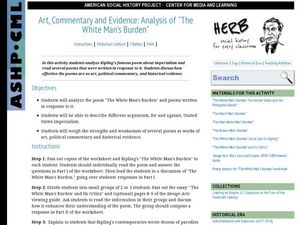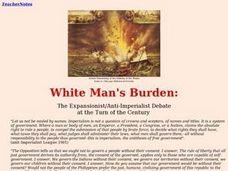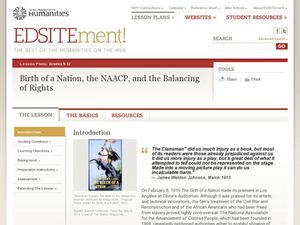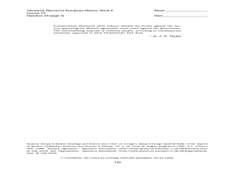Curated OER
Art, Commentary and Evidence: Analysis of "The White Man's Burden"
A cross-curricular lesson combines poetry and history for your middle and high schoolers. The class critically examines Kipling's poem, "White Man's Burden" as historical evidence of the Imperialist ideology popular during his time. The...
Student Handouts
Examining Primary Sources: Rudyard Kipling, “The White Man’s Burden” (1899)
Combine literature and history with the poem "The White Man's Burden" by Rudyard Kipling. Pupils read the poem and answer four questions about the text.
Curated OER
Excerpt from E.D. Morel's The Black Man's Burden (1920)
The included excerpt would be a perfect contrary follow-up to reading, Rudyard Kipling's White Man's Burden. Journalist E.D. Morel composed the statement against imperialism in 1920. Black Man's Burden is a wonderful primary source...
Curated OER
European Colonialism in Africa
The uglier side of European colonization of Africa is detailed in these slides, which include pictures and information about the Belgian Congo, the Dutch South Africa, and Britain's ongoing tensions with the Boers. Students will be...
Maryland Department of Education
The Concept of Diversity in World Literature Lesson 9: Debating Imperialism
To gain an understanding of Imperialism, class members read Rudyard Kipling's poem, "The White Man's Burden" and Mark Twain's essay, "To the Person Sitting in Darkness." Groups compare these perceptions of non-white cultures with the...
Curated OER
White Man's Burden:The Expansionist/Anti-Imperialist Debate at the Turn of the Century
Students explore the roles of Expansionists and Anti-imperialists and take on the identity of a historical character to defend their position before a Senate committee. Roles of newsmen, senators, and futurists are also assumed in this...
Curated OER
Myth of the Western Man
Young scholars identify ways in which history and culture influence identity. They make a time-line and research dates to identify their significance, as well as, create a self portrait pictorially or verbally, that explores the...
Curated OER
Creating a Cartoon of the Philippine-American War
During the Industrial and commercial expansion of the United States, war broke out between America and the Philippines. Explore conflict, American Imperialism, and political cartoons with this creative project. Learners view the film,...
Curated OER
The "New" European Imperialism
Discuss European Imperialism using this resource. This is an online world history worksheet. Learners answer 20 questions regarding the new European Imperialism using drop-down menus to select their answers for each question. They can...
Curated OER
British Imperialism in India
Tenth graders learn how the differences between Indian and British cultural perspectives, as seen in works of art. Students participate in discussion of the differences in how individuals are viewes by others.
Curated OER
Birth of a Nation, the NAACP, and the Balancing of Rights
Eleventh graders analyze primary sources. In this US History lesson, 11th graders interpret written information. Students evaluate arguments and draw conclusions. Students develop and defend a position.
Stanford University
Philippine-American War Political Cartoon
High schoolers investigate the Philippine War. In this propaganda lesson, students read the a timeline of events during the Philippine War. High schoolers evaluate Philippine propaganda cartoons from the period.
K12 Reader
Literature About Chicago: Prose vs. Poetry
In this comprehension exercise, readers compare Carl Sandburg's "Chicago" to a description of the city from Upton's Sinclair's The Jungle.
Curated OER
Munich: Peace in Our Time
Young scholars examine the Munich Agreement. In this World War II lesson, students analyze the agreement made among Germany, the United Kingdom, France, and Italy. Young scholars discuss the strengths and weaknesses of the agreement.
Curated OER
Classroom Management Using Gandhian and Kingian Principles of Nonviolence
Tenth graders study the concept of civil disobedience. In this Current Events lesson, 10th graders participate in a survey that nominates students for hard work and exemplifies nonviolence.
CommonLit
Common Lit: The White Man's Burden
A learning module that begins with "The White Man's Burden" by Rudyard Kipling, accompanied by guided reading questions, assessment questions, and discussion questions. The text can be printed as a PDF or assigned online through free...
Open Door Team
Open Door Web Site: White Man's Burden
Describes the results of colonization, focusing on the lack of economic profit and more on the civil/social motivations and results. Also contains Rudyard Kipling's commentary on colonization as expressed in his poem "White Man's Burden."
Schools of California Online Resources for Education
Score: White Man's Burden
Teachers: Lesson from SCORE that explores the Expansionist/ Anti-Imperialist debate at the turn of the century. Organized as a U.S. history unit, content includes information about the debate, as well as numerous resources, online...
Other
Modern World History: The Causes and Motivations for the Scramble for Africa
Industrialization led to the "scramble for Africa" by European countries seeking raw materials, markets, and cheap labor. However, other factors played a role such as political, ideological, and religious reasons. Examine these reasons...
Georgia Department of Education
Ga Virtual Learning: Ap Literature & Composition: The Journey Motif
This unit focuses on the "Journey Motif" using the following works: Heart of Darkness by Joseph Conrad, "Shooting An Elephant" by George Orwell, "Journey" by Edna St. Vincent Millay,"Sailing to Byzantium" by William Butler Yeats, "The...
University of Groningen
American History: Essays: Manifest Destiny: Many Shades of Manifest Destiny
A discussion of the other guises of Manifest Destiny, including imperialism, yellow journalism, the idea of the white man's burden, the Monroe Doctrine, and the Roosevelt Corollary.
National Humanities Center
National Humanities Center: Toolbox Library: "Burden," the Gilded and the Gritty: America, 1870 1912
This site includes poems and editorials, some of which that praise, others that harshly condemn what Rudyard Kipling asserted was the "White Man's Burden."
The History Cat
The History Cat: Age of Imperialism: European Imperialism
The White Man's Burden was another name for Imperialism. It was an ethnocentric idea that emerged from Darwin's Theory of Evolution to explain why white people were living in what they believed were more advanced civilizations than...
Gilder Lehrman Institute of American History
Gilder Lehrman Institute: History Now: Empire Building
[Free Registration/Login Required] A lengthy essay about American focus on foreign affairs after the Civil War, expanding particularly in the late 19th century. Read about U.S. exploits in the Caribbean, Latin America, and the Pacific...























